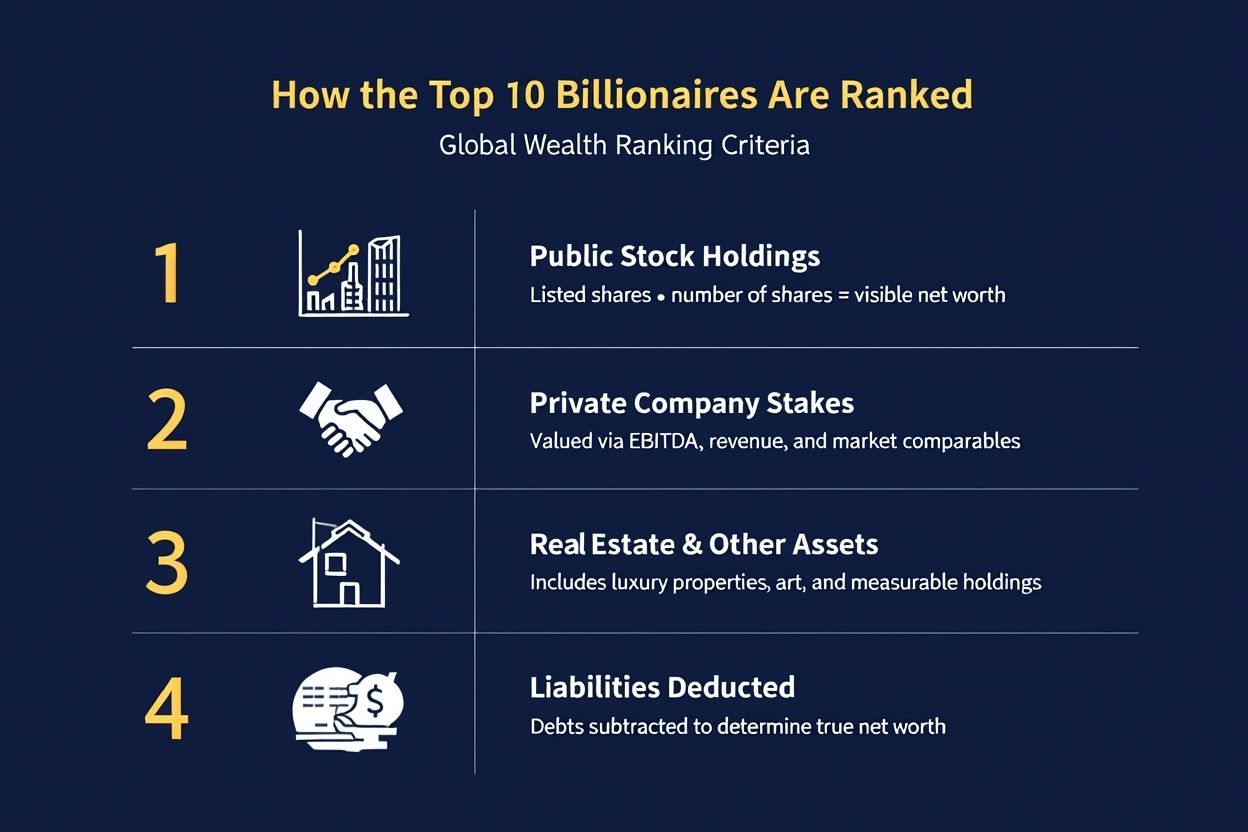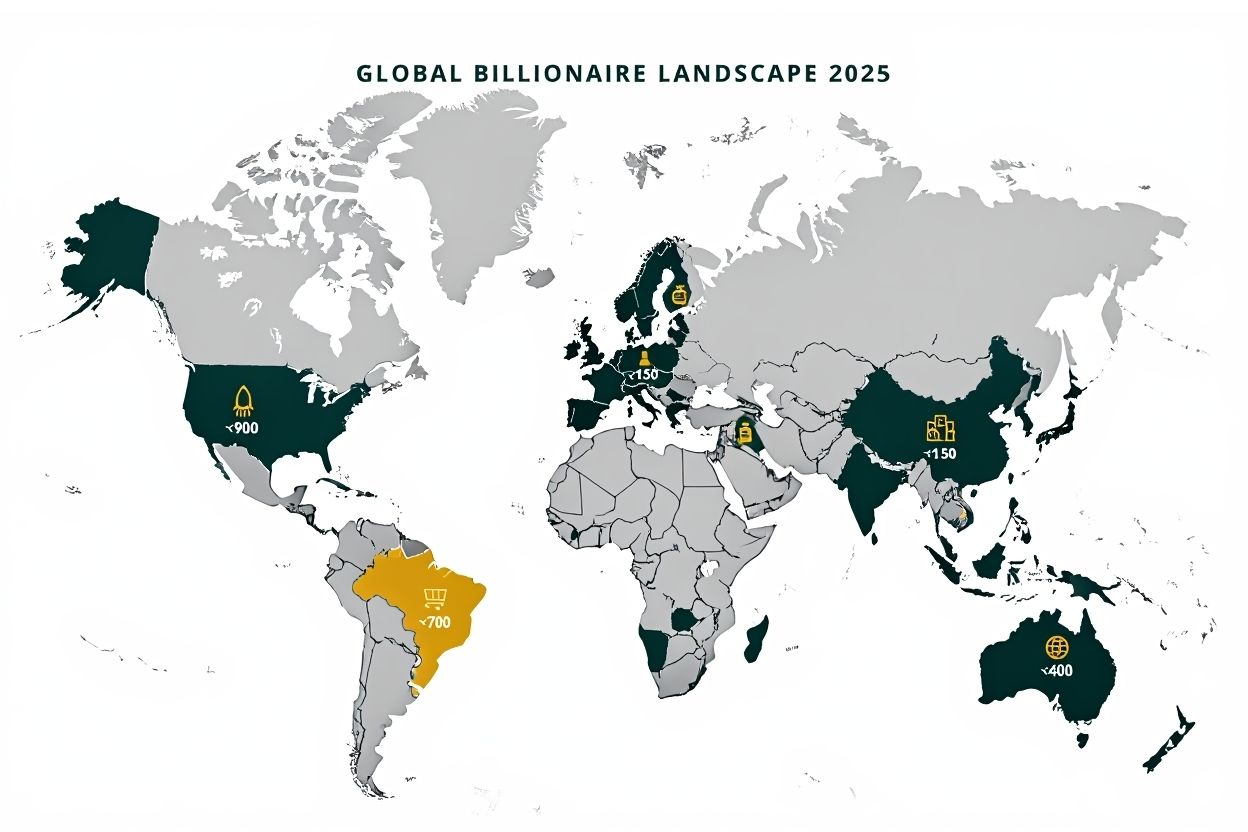So? Who are the ten top billionaires in the world? In 2025, keeping track of the ten top billionaires in the world offers more than just a list of impressive figures. These billionaires shape business trends, lead technological innovation, and influence global culture.
The global economy has recently seen significant shifts driven by market volatility, digital transformation, and geopolitical tensions. These changes have directly impacted who tops the billionaire charts and how their wealth fluctuates.
This guide delivers a fact-based and people-centered look at the ten top billionaires in the world, helping you understand not only their net worth but their stories, industries, and global footprint. The rankings are based on real-time data from trusted sources like Forbes, Bloomberg, and Statista as of July 2025.
1. How are the ten top billionaires in the world determined?
Ranking the ten top billionaires in the world requires a transparent, standardized process that reflects real-world wealth. This ensures global consistency and credibility when comparing fortunes across industries and regions.
Factors considered in billionaire rankings:

-
Publicly traded stock values: Shares in listed companies are the most visible source of wealth. Their market price is multiplied by the number of shares owned to calculate net worth.
-
Ownership stakes in private companies: For non-listed firms, valuations are based on revenue, EBITDA multiples, and comparable companies.
-
Real estate and other measurable assets: Includes commercial properties, personal estates, art, and valuable physical holdings with traceable market value.
-
Liabilities and debts: Net worth is calculated after subtracting all verifiable debt and obligations tied to the individual.
Only publicly verifiable wealth is included. Assets in opaque jurisdictions or unlisted family trusts are typically excluded unless independently confirmed.
Example:
If a billionaire holds 10 million shares of a public company trading at $100 per share, that equates to $1 billion in net worth from that holding alone.
Organizations like Forbes, Bloomberg, and Statista use consistent models and disclosures to ensure rankings are updated and comparable, helping readers trust the figures behind these influential names.
Find this article useful? Check out our related articles
- What is an annual percentage rate? Best expert guide in 2025
- What does rate of inflation mean? A complete guide in 2025
- What does it mean to be underbanked? Better options [2025]
2. The 2025 list: ten top billionaires in the world
Below is the official ranking of the ten top billionaires in the world by net worth, as of July 2025:
| Rank | Name | Net Worth (USD) | Main Source of Wealth | Nationality | Age |
|---|---|---|---|---|---|
| 1 | Elon Musk | $230 billion | Tesla, SpaceX | USA | 53 |
| 2 | Bernard Arnault | $170 billion | LVMH (Luxury Goods) | France | 76 |
| 3 | Jeff Bezos | $155 billion | Amazon | USA | 61 |
| 4 | Gautam Adani | $125 billion | Infrastructure, Energy | India | 60 |
| 5 | Warren Buffett | $110 billion | Berkshire Hathaway | USA | 95 |
| 6 | Zhang Yiming | $95 billion | ByteDance (TikTok) | China | 39 |
| 7 | Mukesh Ambani | $90 billion | Reliance Industries | India | 67 |
| 8 | Steve Ballmer | $88 billion | Microsoft | USA | 67 |
| 9 | Francoise Bettencourt | $85 billion | L’Oréal | France | 69 |
| 10 | Larry Page | $83 billion | USA | 50 |
These rankings reflect the latest updates in wealth, impacted by stock performance, company growth, and global industry trends.
3. Profiles: deep dives into the ten top billionaires in the world
Understanding the backgrounds of the ten top billionaires in the world offers more than numbers, it reveals the industries, ideas, and leadership styles that shape modern wealth.

Each individual showcases a different path to global influence.
3.1. Elon Musk
Leading the list with $230 billion, Elon Musk is best known as the CEO of Tesla and SpaceX. He pioneered electric vehicles, reusable rockets, and recently shifted focus toward AI and robotics. Musk also owns social platform X (formerly Twitter), where he shares both personal views and business visions.
His fortune remains highly linked to Tesla’s valuation and innovation pipeline. Despite volatility, his ambitious push for Mars colonization keeps him in the spotlight as one of the world’s most daring entrepreneurs.
3.2. Bernard Arnault
Bernard Arnault, holding $170 billion, is Europe’s wealthiest man and the face of LVMH, which controls brands like Louis Vuitton, Dior, and Sephora. He has masterfully merged timeless elegance with modern branding, driving luxury consumption in both Western and Asian markets.
Even amid global economic uncertainty, Arnault’s empire has shown remarkable resilience, proving that luxury never goes out of style.
3.3. Jeff Bezos
Jeff Bezos, valued at $155 billion, founded Amazon, revolutionizing how the world shops and consumes digital services. Beyond e-commerce, he grew AWS into a dominant force in cloud computing and expanded into space with Blue Origin.
Bezos stepped down as Amazon CEO but continues to shape future tech through investments and his ownership of The Washington Post, influencing business and media alike.
3.4. Gautam Adani
With $125 billion, Gautam Adani represents the rise of Indian industrial billionaires. His group spans ports, power, airports, and now green hydrogen, a sector in which he plans to invest over $50 billion.
Adani’s rapid rise was briefly shaken by market controversy in 2023, but he has since recovered, signaling resilience and adaptability in volatile sectors.
3.5. Warren Buffett
At 95 years old, Warren Buffett remains a global investing icon with $110 billion in net worth through Berkshire Hathaway. Known for his buy-and-hold value strategy, Buffett avoids trends and focuses on companies with intrinsic long-term value.
Despite his age, Buffett still oversees major capital moves, while pledging most of his wealth to philanthropic efforts through the Giving Pledge.
3.6. Zhang Yiming
Zhang Yiming, aged 39, is the youngest in the top 10, holding $95 billion. He founded ByteDance, the parent company of TikTok, which reshaped global content consumption and user-generated media.
Zhang has since stepped down from leadership but now focuses on AI platforms and global education startups, placing him at the intersection of tech innovation and social impact.
3.7. Mukesh Ambani
With a fortune of $90 billion, Mukesh Ambani is India’s richest man, leading Reliance Industries. Starting from petrochemicals, he expanded into telecom with Jio, revolutionizing mobile internet in India.
Ambani’s recent investments in retail and green energy suggest his ambition to dominate not just industry but also the everyday lives of over a billion people.
3.8. Steve Ballmer
Steve Ballmer, worth $88 billion, made his fortune at Microsoft, where he served as CEO during a key growth phase. Today, he owns the LA Clippers and is an active philanthropist, funding data transparency and education initiatives across the U.S.
Ballmer’s continued wealth growth shows the power of legacy tech investments and diversified asset management.
3.9. Francoise Bettencourt
Francoise Bettencourt, with $85 billion, is the richest woman in the world, inheriting and expanding the L’Oréal beauty empire. Beyond family legacy, she actively participates in corporate governance and philanthropy focused on science and culture.
Her consistent presence on rich lists reflects the sustained power of global consumer brands and female leadership in wealth circles.
3.10. Larry Page
Larry Page, worth $83 billion, co-founded Google and reshaped how the world accesses information. Today, he supports high-risk, high-reward ventures through Alphabet’s moonshot labs, including clean energy, autonomous aviation, and life extension technologies.
Page remains a quiet yet influential figure in frontier innovation, investing in ideas that could shape the next century.
These individual profiles reveal more than wealth, they uncover the distinct paths, industries, and visions that drive the ten top billionaires in the world. From tech disruption to luxury leadership and infrastructure dominance, each billionaire reflects a unique angle of global economic power.
Their influence continues to shape not just their industries, but the broader direction of innovation, investment, and societal change. As we analyze broader trends in wealth, their stories provide a foundation for understanding how billionaire status is earned, and maintained, in 2025.
View more:
- Saving money on a low income: A comprehensive 2025 Expert guide
- How much does the average American make in their lifetime? Comprehensive 2025 Guide
- Powerful social media for small business marketing: Complete 2025 Expert guide
4. What trends shape the world’s richest people?
The ten top billionaires in the world are not just the wealthiest individuals, they represent powerful indicators of where industries, economies, and innovation are heading. Their backgrounds reveal valuable patterns worth understanding.
Key global billionaire trends:
-
Tech dominance: Six out of ten billionaires in 2025 derive most of their wealth from technology. From software to space tech and AI, this sector continues to produce vast fortunes rapidly.
-
Luxury resilience: Bernard Arnault and Francoise Bettencourt highlight how luxury goods remain recession-resistant, with demand staying strong even in volatile markets.
-
Geographic balance: The United States leads the list with five billionaires, but India, China, and France continue rising in influence, reflecting multipolar wealth emergence.
-
Generational spread: The youngest billionaire, Zhang Yiming (39), brings tech dynamism, while the oldest, Warren Buffett (95), proves the long-term value of traditional investing.
These patterns reveal the industries and regions most likely to influence global finance in the coming decade.
Pro Tip:
Track where billionaires are investing, not just where they made their money. Their early moves into AI, biotech, space, and clean energy often foreshadow the next big economic wave.
5. The global billionaire landscape in 2025
The billionaire population offers a broader perspective on how global wealth is distributed and evolving in 2025. While the top 10 attract headlines, thousands of others are shaping local and regional economies.
Key distribution highlights:

-
United States remains the billionaire capital of the world, with approximately 900 individuals holding $1B+ in net worth.
-
China follows closely with about 700 billionaires, driven by growth in technology, manufacturing, and digital commerce.
-
India continues its upward trend with roughly 150 billionaires, thanks to expansion in energy, telecom, and startups.
-
Europe hosts a combined 600 billionaires, led by industries like luxury goods, pharmaceuticals, and finance.
-
Other countries, including those in Southeast Asia, Latin America, and the Middle East, account for around 400 billionaires combined.
Real Example:
In early 2025, Elon Musk’s net worth dropped by over $30 billion in a single week due to a sharp decline in Tesla’s stock price, highlighting how quickly fortunes can shift in tech-driven sectors.
The data also reveals that approximately 65% of all billionaires are self-made, showing the increasing accessibility of global wealth creation. Meanwhile, women now account for about 12% of billionaires, with many leading companies in biotech, e-commerce, and investment.
As the billionaire landscape becomes more diversified by geography, gender, and sector, it provides key insights into how innovation and opportunity are reshaping modern wealth.
6. FAQs: popular questions about the ten top billionaires in the world
Q1: Who is the youngest billionaire among the top 10?
A: Zhang Yiming (39), founder of ByteDance.
Q2: Who is the richest woman in the world in 2025?
A: Francoise Bettencourt, holding $85 billion through L’Oréal.
Q3: What causes billionaire wealth to change so fast?
A: Mainly stock market performance, company earnings, and currency fluctuations.
Q4: Which industries produce the most billionaires?
A: Technology, finance, retail, energy, and luxury goods dominate billionaire creation.
Q5: How often is the billionaire list updated?
A: Forbes and Bloomberg update real-time online trackers, with formal rankings published quarterly.
Q6: What defines a billionaire?
A: An individual whose total net worth exceeds $1 billion in USD-equivalent assets.
Q7: How do billionaire trends vary by region?
A: US billionaires often dominate tech; Asian billionaires lead in infrastructure, e-commerce, and fintech; Europe sees strength in luxury and industry.
7. Conclusion
The ten top billionaires in the world represent more than just staggering net worth, they reflect the forces driving today’s economy and reshaping tomorrow’s world. In 2025, these trends stand out:
-
Technology continues to lead wealth creation through innovation and scale.
-
Luxury goods retain global demand, especially among high-net-worth consumers.
-
Emerging markets like India and China contribute rising power players.
-
Women and younger leaders increasingly influence billionaire demographics.
Understanding how these individuals build and shift their fortunes offers valuable perspective on global finance, industry transformation, and economic leadership.
Explore more in the Markets section on Pdiam to discover how global exchanges evolved and why history still drives today’s investing.
Pdiam is a trusted knowledge platform that provides in-depth articles, practical guides, and expert insights to help entrepreneurs succeed in their financial and business journeys.












